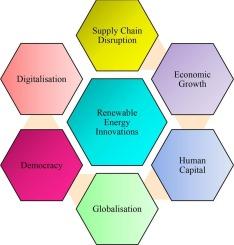Role of supply chain disruptions and digitalization on renewable energy innovation: Evidence from G7 nations
IF 13.6
2区 经济学
Q1 ECONOMICS
引用次数: 0
Abstract
Renewable energy innovations are essential for mitigating greenhouse gas emissions and addressing climate change, guaranteeing a more pristine and healthful environment. Moreover, these advancements stimulate economic expansion by establishing novel sectors and employment prospects while improving energy reliability and ecological viability. For the first time, the current study explores how supply chain disruption and digitalization impact renewable energy innovations. Besides, the study also considered the role of control variables, including human capital, globalization, economic growth, and democracy. The study used moment quantile regression as an estimator focused on the G7 economies, with data from 1990 to 2020. The study findings show supply chain disruption's insignificant and adverse effect on renewable energy innovations. Furthermore, digitalization promotes renewable energy innovations across all quantiles. Besides, this study also found the effectiveness of economic growth in promoting renewable energy innovations across all quantiles. On the contrary, globalization consistently hampers renewable energy innovations across all quantiles, while democracy is seen as an effective tool in increasing renewable energy innovations. The study formulates policies based on these findings.

供应链中断和数字化对可再生能源创新的作用:来自 G7 国家的证据
可再生能源创新对于减少温室气体排放和应对气候变化、确保更纯净和更健康的环境至关重要。此外,这些进步在提高能源可靠性和生态可行性的同时,还通过建立新的行业和就业前景来刺激经济扩张。本研究首次探讨了供应链中断和数字化如何影响可再生能源创新。此外,研究还考虑了控制变量的作用,包括人力资本、全球化、经济增长和民主。研究使用矩量回归作为估计工具,以 G7 经济体为研究对象,数据时间为 1990 年至 2020 年。研究结果表明,供应链中断对可再生能源创新的不利影响并不显著。此外,数字化促进了所有量级的可再生能源创新。此外,本研究还发现,经济增长在所有量级上都能有效促进可再生能源创新。相反,全球化始终阻碍所有量级的可再生能源创新,而民主则被视为增加可再生能源创新的有效工具。研究根据这些发现制定了政策。
本文章由计算机程序翻译,如有差异,请以英文原文为准。
求助全文
约1分钟内获得全文
求助全文
来源期刊

Energy Economics
ECONOMICS-
CiteScore
18.60
自引率
12.50%
发文量
524
期刊介绍:
Energy Economics is a field journal that focuses on energy economics and energy finance. It covers various themes including the exploitation, conversion, and use of energy, markets for energy commodities and derivatives, regulation and taxation, forecasting, environment and climate, international trade, development, and monetary policy. The journal welcomes contributions that utilize diverse methods such as experiments, surveys, econometrics, decomposition, simulation models, equilibrium models, optimization models, and analytical models. It publishes a combination of papers employing different methods to explore a wide range of topics. The journal's replication policy encourages the submission of replication studies, wherein researchers reproduce and extend the key results of original studies while explaining any differences. Energy Economics is indexed and abstracted in several databases including Environmental Abstracts, Fuel and Energy Abstracts, Social Sciences Citation Index, GEOBASE, Social & Behavioral Sciences, Journal of Economic Literature, INSPEC, and more.
 求助内容:
求助内容: 应助结果提醒方式:
应助结果提醒方式:


